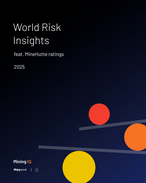This article is 8 years old. Images might not display.
Announced on Friday afternoon, Rio will work with the WA government and South Metropolitan TAFE to prepare students for opportunities created by advances in technology and innovation.
Rio Tinto Iron Ore chief executive Chris Salibury said investing in education and training was essential to keep pace with rapid advances in the mining industry.
"We are generating opportunities for our current and future workforce to gain skills and competencies for smart mining," he said.
"The new curriculum will enhance the capability of those in the mining sector and form part of the learning pathways for those seeking to enter a range of industries applying automation and technology."
Salisbury said new courses would likely be in the areas of robotics, data analytics and digital inclusion education.
It is proposed that the curriculum development will be completed by the end of next year to enable the delivery of new industry traineeships and post-secondary courses from 2019.
Rio has pledged to recruit over 160 new graduates, holiday students, apprentices and trainees in WA next year.
"As pioneers in innovation, Rio Tinto is proud to be working with the Western Australian government and South Metropolitan TAFE on this important skilling and education initiative," Salisbury said.
"The demand for people educated in the areas of science, technology, engineering and mathematics will continue to grow.
"I invite my industry partners, who are also investing in automation technology, to join us in this collaborative education initiative as the state economy continues to diversify."
The Chamber of Minerals and Energy said the announcement was part of a wider effort by the resources sector to prepare local students for mining jobs of the future.
CME CEO Reg Howard-Smith said in response to the increasing changes to technology and automation, CME was actively working to ensure the sector's future workforce had the flexibility and skills to adapt and respond to a more complex operating environment.
"Advances in surface mining, faster communications capability and the need to achieve more efficiencies to remain internationally competitive has seen the emergence of remote operations facilities where multiple mine sites can be remotely operated from another location," he said.
"The Resources Industry Training Council (RITC), a state government-funded initiative hosted by CME, is undertaking a project to establish a training model for entry to Surface Mining Operations, as well as create a purpose-built qualification to meet the needs of these remote operations facility workers."

























